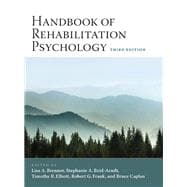The handbook has been significantly updated to reflect these new developments. Chapters address several core topics, such as education and training in rehabilitation psychology, competency-based practice, and fluctuating health policy. Additional chapters cover the assessment and treatment of specific health conditions, including chronic pain, acquired disability, spinal cord injury, traumatic brain injury, and amputation. This edition also includes information about artificial intelligence, virtual reality, public health, community rehabilitation, and other innovations in health care.
Contributors are not only visionaries in the rehabilitation field but also expert practitioners in key areas. They integrate their experience with empirical research, highlight methodological advances, recommend best practices, discuss policy implications, and identify possibilities for the future.
Both experienced clinicians and early-career practitioners will find this book an invaluable resource for delivering effective behavioral health care to people with chronic health conditions.









